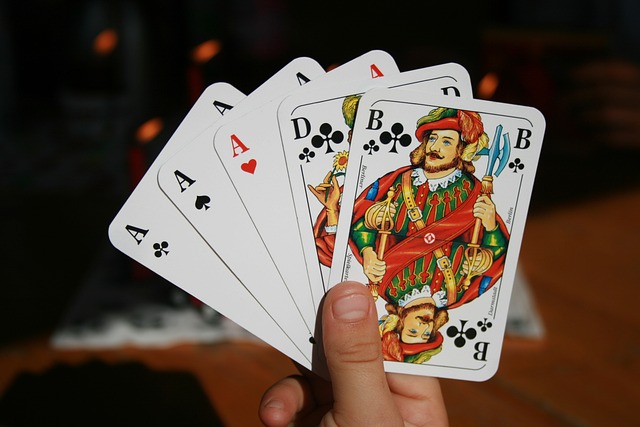Chinese Poker (Ma Tia/Big Two) is a captivating poker game played with a 52-card deck, often including jokers. Players aim to discard all cards by forming pairs or groups of identical numbers, combining personal and community cards while betting in rounds. This blend of luck and skill, requiring hand management and positional awareness, makes it an engaging choice for gamers aged 3-6, setting it apart from other poker games with its strategic emphasis on predicting opponents' hands. Variations allow customization, appealing to both beginners and advanced players worldwide.
Discover the thrilling world of Chinese Poker, a unique twist on traditional poker that’s taken Asia by storm. This fast-paced game, often played with special cards featuring Chinese characters, offers a blend of luck and skill unlike any other poker variant. In this article, we’ll explore the basics, delve into the rules, uncover strategic insights, and showcase popular variations, helping you master this captivating Poker Games experience.
What is Chinese Poker?

Chinese Poker, also known as “Ma Tia” or “Big Two,” is a popular card game in China and among Chinese communities worldwide. It’s one of many poker games that has evolved from traditional playing cards to modern versions, each with its unique rules and appeal. The objective is simple yet engaging: players aim to be the first to get rid of all their cards by forming pairs or groups of three or four identical numbers.
This game is played with a standard 52-card deck, often adding jokers for more dynamic gameplay. What sets Chinese Poker apart is its emphasis on strategic thinking and quick decision-making. Players must carefully manage their hands, anticipating their opponents’ moves while planning their own to ensure they discard cards efficiently. It’s a game that combines luck with skill, making it both entertaining and intellectually stimulating for players of all ages.
Rules and Gameplay

Chinese Poker is a unique variation of traditional poker games, offering a blend of strategy and luck. The gameplay involves multiple players, typically 3 to 6, where each participant receives a set number of cards, usually 10 or 12, forming their hand. The objective is to create the best possible poker hand according to standard poker rankings, such as High Card, One Pair, Two Pairs, Three of a Kind, and so on.
The rules dictate that players must use a combination of their dealt cards and community cards, which are shared among all players. Bet rounds occur after each round of card distribution, allowing players to raise, call, or fold. The game progresses until one player remains, who wins the pot. Chinese Poker demands skill in hand management, positional awareness, and an understanding of odds, making it a captivating choice among poker enthusiasts.
Strategy and Variations

Chinese Poker, a unique twist on traditional card games, offers a blend of strategy and skill that sets it apart from many other poker games. The core objective remains the same—to form the best hand possible using a combination of community cards and personal cards. However, what distinguishes Chinese Poker is its emphasis on strategic decision-making and adaptation. Players must consider not only their own hands but also the potential hands of their opponents based on their betting patterns. This predictive aspect adds a layer of complexity that appeals to experienced players seeking a mental challenge.
Variations of Chinese Poker introduce further diversity, allowing players to customize their experience. Rules can be adjusted, such as altering the number of cards dealt or changing the betting structure, creating diverse game dynamics. These variations cater to different preferences, ensuring that enthusiasts can explore multiple facets of this captivating poker games. From beginner to advanced levels, Chinese Poker’s strategic depth makes it a favorite among card enthusiasts worldwide.
Chinese Poker, one of many captivating poker games, offers a unique blend of strategy and luck. By understanding the rules, mastering gameplay, and exploring variations, players can enhance their skills and enjoy this ancient yet ever-popular game. Whether for leisure or competition, Chinese Poker’s simple yet engaging nature makes it a favorite among enthusiasts worldwide, continuing to evolve and captivate in the realm of poker games.






